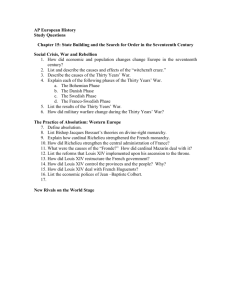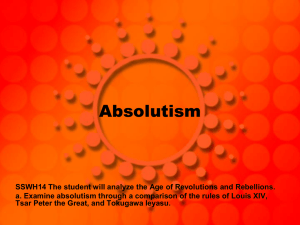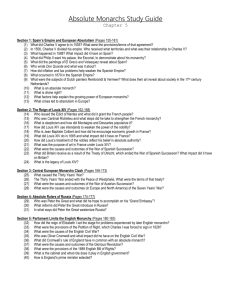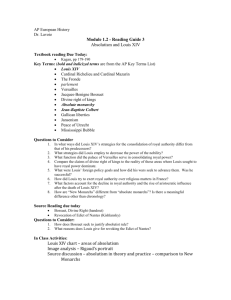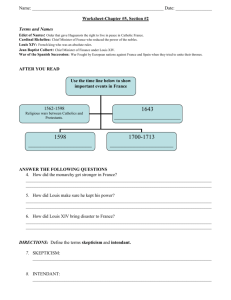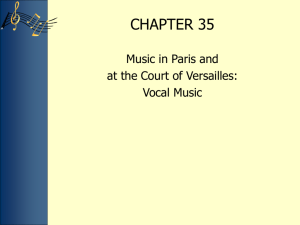CONSTITUTIONALISM & ABSOLUTISM: BRITAIN & FRANCE in the
advertisement
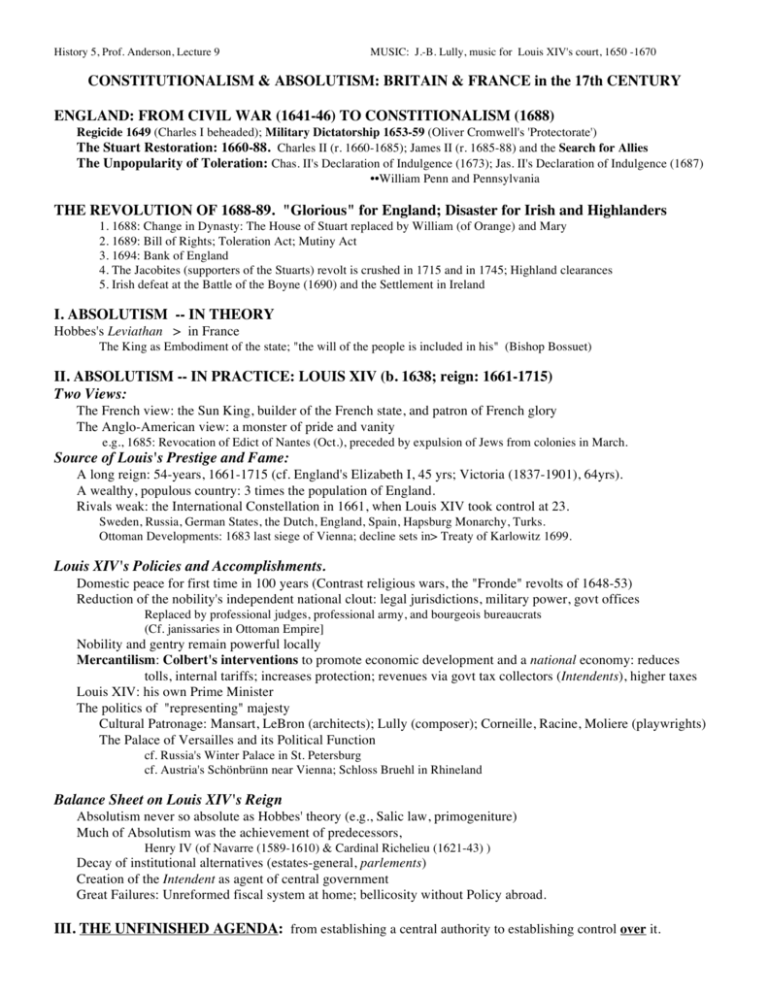
History 5, Prof. Anderson, Lecture 9 MUSIC: J.-B. Lully, music for Louis XIV's court, 1650 -1670 CONSTITUTIONALISM & ABSOLUTISM: BRITAIN & FRANCE in the 17th CENTURY ENGLAND: FROM CIVIL WAR (1641-46) TO CONSTITIONALISM (1688) Regicide 1649 (Charles I beheaded); Military Dictatorship 1653-59 (Oliver Cromwell's 'Protectorate') The Stuart Restoration: 1660-88. Charles II (r. 1660-1685); James II (r. 1685-88) and the Search for Allies The Unpopularity of Toleration: Chas. II's Declaration of Indulgence (1673); Jas. II's Declaration of Indulgence (1687) ••William Penn and Pennsylvania THE REVOLUTION OF 1688-89. "Glorious" for England; Disaster for Irish and Highlanders 1. 1688: Change in Dynasty: The House of Stuart replaced by William (of Orange) and Mary 2. 1689: Bill of Rights; Toleration Act; Mutiny Act 3. 1694: Bank of England 4. The Jacobites (supporters of the Stuarts) revolt is crushed in 1715 and in 1745; Highland clearances 5. Irish defeat at the Battle of the Boyne (1690) and the Settlement in Ireland I. ABSOLUTISM -- IN THEORY Hobbes's Leviathan > in France The King as Embodiment of the state; "the will of the people is included in his" (Bishop Bossuet) II. ABSOLUTISM -- IN PRACTICE: LOUIS XIV (b. 1638; reign: 1661-1715) Two Views: The French view: the Sun King, builder of the French state, and patron of French glory The Anglo-American view: a monster of pride and vanity e.g., 1685: Revocation of Edict of Nantes (Oct.), preceded by expulsion of Jews from colonies in March. Source of Louis's Prestige and Fame: A long reign: 54-years, 1661-1715 (cf. England's Elizabeth I, 45 yrs; Victoria (1837-1901), 64yrs). A wealthy, populous country: 3 times the population of England. Rivals weak: the International Constellation in 1661, when Louis XIV took control at 23. Sweden, Russia, German States, the Dutch, England, Spain, Hapsburg Monarchy, Turks. Ottoman Developments: 1683 last siege of Vienna; decline sets in> Treaty of Karlowitz 1699. Louis XIV's Policies and Accomplishments. Domestic peace for first time in 100 years (Contrast religious wars, the "Fronde" revolts of 1648-53) Reduction of the nobility's independent national clout: legal jurisdictions, military power, govt offices Replaced by professional judges, professional army, and bourgeois bureaucrats (Cf. janissaries in Ottoman Empire] Nobility and gentry remain powerful locally Mercantilism: Colbert's interventions to promote economic development and a national economy: reduces tolls, internal tariffs; increases protection; revenues via govt tax collectors (Intendents), higher taxes Louis XIV: his own Prime Minister The politics of "representing" majesty Cultural Patronage: Mansart, LeBron (architects); Lully (composer); Corneille, Racine, Moliere (playwrights) The Palace of Versailles and its Political Function cf. Russia's Winter Palace in St. Petersburg cf. Austria's Schönbrünn near Vienna; Schloss Bruehl in Rhineland Balance Sheet on Louis XIV's Reign Absolutism never so absolute as Hobbes' theory (e.g., Salic law, primogeniture) Much of Absolutism was the achievement of predecessors, Henry IV (of Navarre (1589-1610) & Cardinal Richelieu (1621-43) ) Decay of institutional alternatives (estates-general, parlements) Creation of the Intendent as agent of central government Great Failures: Unreformed fiscal system at home; bellicosity without Policy abroad. III. THE UNFINISHED AGENDA: from establishing a central authority to establishing control over it. History 5, Prof. Anderson, Lecture 9 MUSIC: J.-B. Lully, music for Louis XIV's court, 1650 -1670 SOME OF MY SOURCES FOR THIS LECTURE: Richard S. Dunn, The Age of the Religious Wars, 1559-1715 ([1970] 1979). J. H. Elliot, "The Decline of Spain," in Trevor Aston, ed., Crisis in Europe 1560-1660 (1965). Georges Lacour-Gayet, L´Éducation politique de Louis XIV ([1898], 1923). Brian Manning, "The Nobles, The People, and the Constitution," in Trevor Aston, ed., Crisis in Europe 1560-1660 (1965). Jean Orcibal, Louis XIV et les Protestants. La cabale des accommodeurs de religion; la Caisse des conversions, la révocation de l’Édit de Nantes (1951). Leslie P. Peirce, The imperial harem: women and sovereignty in the Ottoman Empire (1993).


